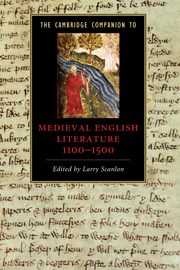Book contents
- Frontmatter
- Introduction
- Part I Contexts, genres, and traditions
- 1 Re-inventing the vernacular: Middle English language and its literature
- 2 Textual production and textual communities
- 3 Religious writing: hagiography, pastoralia, devotional and contemplative works
- 4 Romance
- 5 Dialogue, debate, and dream vision
- 6 Drama
- 7 Lyric
- 8 Lollard writings
- Part II Authors
- Guide to further reading
- Index
7 - Lyric
from Part I - Contexts, genres, and traditions
Published online by Cambridge University Press: 28 November 2009
- Frontmatter
- Introduction
- Part I Contexts, genres, and traditions
- 1 Re-inventing the vernacular: Middle English language and its literature
- 2 Textual production and textual communities
- 3 Religious writing: hagiography, pastoralia, devotional and contemplative works
- 4 Romance
- 5 Dialogue, debate, and dream vision
- 6 Drama
- 7 Lyric
- 8 Lollard writings
- Part II Authors
- Guide to further reading
- Index
Summary
Westron winde, when will thow blow,
The smalle raine downe can raine?
Christ, if my love were in my armes,
And I in my bed againe.
This famous brief song, which has caught the imagination of many modern readers, encapsulates both the attraction and the complexity involved in interpreting medieval lyrics. The direct, lightly ironic first-person voice speaks so clearly across the centuries that we hear its tone and feel its desire as if the speaker were within hailing distance. This song functions perfectly as a modern lyric: it is short and condensed, it is personal and erotic, it even swears with a modern expletive accent and emphasis. Yet for many readers there will be a nagging doubt about the validity of this description: can a medieval writer really have been as frankly secular as this, so individual, so mockingly post-modern? “Westron wind” must surely be more medieval than it looks. Sure enough, some of these suspicions are confirmed by its sources. Only one copy survives, as it happens with music, in a sixteenth-century Tudor song book (BL MS Royal Appendix 58, fo. 5): it must date from earlier than this, but we have no way of telling how much. All we know is that it also crops up in settings of the mass by the sixteenth-century composers John Taverner, Christopher Tye, and John Sheppard. Such premodern liturgical contexts seem a powerful corrective to any sense of the song's self-sufficient erotic secularity.
How then should we read “Westron wind”? Much twentieth-century criticism has been rebuking: assuring us that “late Middle English love lyrics were seldom, if ever, purely literary distillations of moments of intense, private emotion.” Medieval short verse is essentially practical, formulaic, devoid of intellectual ideas, imagery, or paradox, and above all, religious. The problem is that “Westron wind” and others like it have proved stubbornly resistant to such rebukes: however much they demand to be interpreted historically in one way, they seem to speak in another.
- Type
- Chapter
- Information
- Publisher: Cambridge University PressPrint publication year: 2009
- 3
- Cited by

